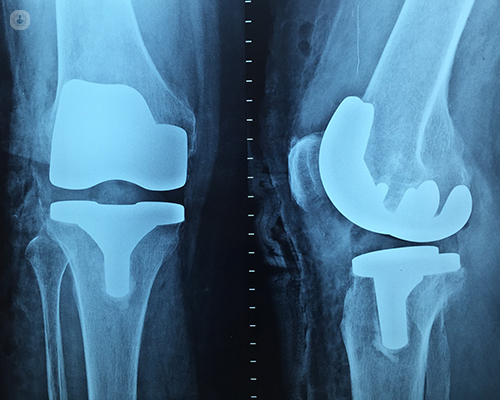What is the difference between primary and revison knee replacements?
Written in association with:Knee replacements are usually quite successful and can offer a new lease of life to the patient undergoing the procedure. However, sometimes a revision knee replacement will be necessary. In his latest online article, renowned orthopaedic surgeon Mr Koushik Ghosh explains this procedure in detail.

What is the difference between primary and revision knee arthroplasty?
A primary knee arthroplasty is a very commonly performed procedure that involves a patient undergoing a joint replacement for the first time. Essentially, the difference between this and the revision knee replacement is that you're revising and changing a primary knee replacement to a revised new replacement.
There are certainly other differences from the point of view of the complexity of the procedure. A patient may need a revision knee replacement for many different reasons, including instability, pain, stiffness, infection or loosening.
Will a patient with a primary knee replacement need a revision knee replacement?
It’s not necessarily the case that someone who's had a primary knee replacement inevitably needs a revision knee replacement. It really depends on several different factors.
One such factor is the age of the patient. We know that younger patients tend to use the primary replacement a lot more whether it be in their occupation, hobbies or pastimes. They tend to walk longer distances, run and play sports a lot more than older recipients of a knee replacement. These activities are going to wear out a knee replacement a lot faster.
The likelihood of needing revision is dependent on this, as well as other physical factors such as the weight of the patient and certain genetic factors.

When is a revision knee replacement necessary?
A revision knee replacement is generally necessary when the basic principles of joint replacement are not being fulfilled. These principles are a pain-free stable joint, with a full range of motion, that you can fully weight bear on. There are a variety of different causes that can cause a primary knee replacement to fail. These could include infection, fracture and loosening.
What are the benefits of undergoing revision knee arthroplasty?
The benefits of a revision knee replacement boil down to what the patient wants and what they expect. By the time we come to needing a revision knee arthroplasty, most people will be happy with a stable pain-free joint that you can fully weight bear on.
It can get you back to other levels of activity such as playing doubles tennis or skiing or even walking long distances. Generally speaking, we wouldn't want someone to run or kneel on their knee replacement. However, the benefit of a revision knee replacement is essentially giving you another lease of life with regard to your joint. It can give you another 20 to 30 years of good stability having a pain-free joint and allowing you to do all the things you want to do in life.
Is recovery from a revision knee replacement different from that of a primary operation?
The short answer is yes, primarily due to the level of complexity and the level of dissection that is required in extrapolating an already failed implant. This requires a lot of planning, and usually is done with a multi-disciplinary approach, with a very patient-centred basis.
We talk to the patient and figure out what they need, and what they want to do in life, and look at the x-rays in the image and collate all of this together with a lot of colleagues in a multidisciplinary fashion. I then come up with the most robust and safe way to proceed with the revision knee replacement.
Mr Koushik Ghosh is a leading orthopaedic surgeon based in Worthing. If you would like to book a consultation with Mr Ghosh you can do so today via his Top Doctors profile.


